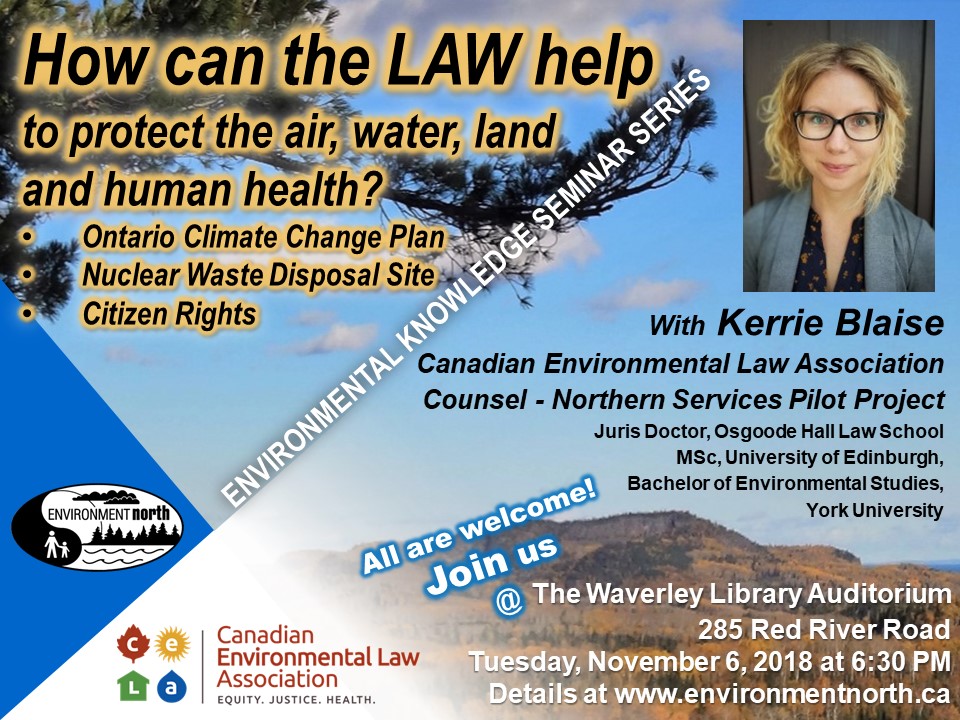How can the LAW help...to protect the air, water, land and human health?
Guest speaker is Kerry Blaise from the Canadian Environmental Law Association CELA) gave a presentation on Noevmeber 6, 2018 about how the law can help to protect the environment from climate change and from toxic nuclear waste.
Kerrie Blaise is the CELA cousel for the new northern services pilot project. To find out more about her work in northern Ontario as well as view recent presentations in Thunder Bay visit: http://www.cela.ca/collections/justice/northern-services.
To read the article about "How the Law can Help" published in the chronicle Journal just scroll down below the pictures...

Protecting the Air, Water and Land - How can the Law Help?
It often seems a daunting task to protect the natural environment. By learning what environmental and participatory rights people have to engage in decision-making and collaborating with others, it is possible to have an impact or achieve success. The Canadian Environmental Law Association (CELA) was established in 1970 and uses legal tools to protect the environment and human health. Top priorities are to represent low income individuals, assist communities and to speak out for those with less influence.
In the past months, CELA has launched the Northern Services pilot project to expand their availability of legal services in Northern Ontario. In August 2018 members of CELA gave a Public Legal Presentation in Thunder Bay about how citizens can mobilize their “right to know”, access pollutant release information and monitor Ontario’s Environmental Registry for public comment opportunities. Further details related to CELA’s northern work and a copy of this presentation are available on their website at cela.ca.
Environment North welcomes CELA back to Thunder Bay As part of the on-going speaker series. Kerrie Blaise is the legal counsel who has taken the lead for the Northern Services pilot project. She will provide insights regarding the legal context of climate change and nuclear waste, two important topics relevant for Northern Ontario. Climate change is affecting boreal forest ecosystems, thawing permafrost and increasing severe weather is causing increase damage to northern municipalities. Clean energy is vital for a healthy environment.
Ontario had been on track to meet its climate change and greenhouse gas reduction targets primarily due to the closure of all coal generation plants. The previous government also established a carbon “cap and trade” program, as the next major step in reducing greenhouse gas emissions. However, the new provincial government has not made climate change a priority – instead, they introduced Bill 4, The Cap and Trade Cancellation Act 2018, which repeals the existing Climate Change Mitigation and Low-carbon Economy Act, 2016. Bill 4 is before the Standing Committee on General Government. There is no alternative climate change plan yet in place.
CELA communicated its opposition to Bill 4 and the provincial government’s decision to cancel the cap and trade program (see www.cela.ca/response-cap-and-trade-revocation). Carbon pricing is an efficient tool to assist the government in meeting its climate change commitments and their transition to a low-carbon economy. It also corresponds to the polluter pay principle where polluters are responsible for actions that have adverse climate effects.
On October 17, the new government asked for public input on their “A Made-in-Ontario Climate Change Plan” (www.ontario.ca/form/tell-us-your-ideas-climate-change). The final day for input is November 16, 2018.
Environment North and CELA do not accept nuclear energy as the “clean and green” solution for reducing greenhouse gas emissions. Although nuclear energy emits few greenhouse gas emissions in the electricity production phase, the nuclear fuel cycle involves carbon intensive construction of reactor sites and leaves a legacy of toxic waste from the mining tailings to the spent nuclear fuel bundles.
The Nuclear Waste Management Organization (NWMO) is tasked with finding a host community for a disposal site for high level-nuclear waste from spent nuclear fuel bundles. The NWMO is currently consulting with five potential communities, three of which, Ignace, Manitouwadge and Hornepayne, are in northern Ontario. A site in the north would require transport through many communities. In 2005, Temiskaming Shores passed a resolution opposing the transportation of nuclear waste through their municipality.
Legitimacy in environmental decision-making requires consideration of socio-economic, cultural, and environmental values. This is particularly so for nuclear waste, given the longevity of the hazard, the issues of long-distance transportation and the impact on future generations. A decision-making process which truly provides an opportunity for the public to influence the outcome must be present in siting consultations currently ongoing in the North.
Environment North welcomes you on Tuesday, November 6, 2018 at the Waverley Library Auditorium at 6:30 pm. Learn how you can become involved in decision-making and ongoing consultations! Admission is free and all are welcome. Visit www.environmentnorth.ca for more details. Graham Saunders is president of Environment North and Kerstin Muth is a member.
